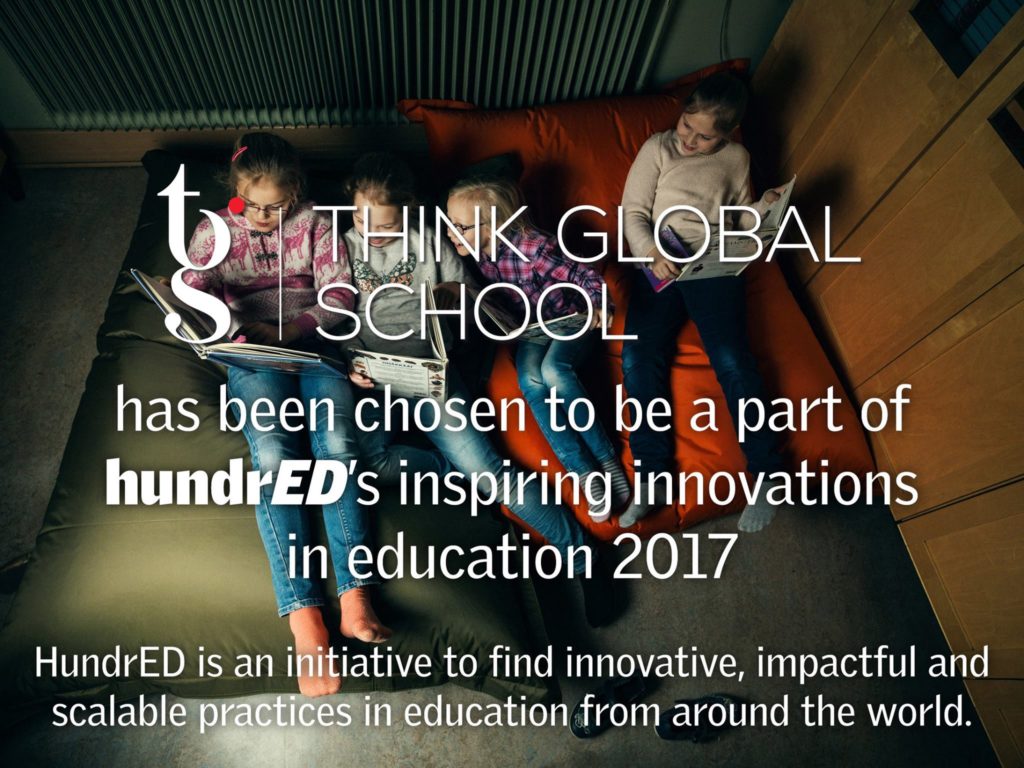As I write this, I'm waiting for our students to return from their weXplore, a five-day excursion that takes students beyond their host city for immersive cultural experiences. For the past two months, we as a school have called Maun, Botswana, our home. It's a small town on the edge of the Okavango Delta and, for many travelers, a doorway into Africa. But Maun is only one perspective, and it...
Read MoreThis past week I had the pleasure of attending the launch party at HundrED.org as a representative of THINK Global School (TGS). If you aren’t familiar with HundrED, their mission is to help schools change by spreading the word of innovative educational practices from across the globe. This year our school, TGS, had the honor of being named as one of these top 100 innovative programs. As I sat through the awards, HundrED’s guiding message was abundantly clear: it isn’t a lack of innovation that is stifling education right now; instead, it’s a hesitancy to adopt these practices on the part of educators around the world.

So why is this the case?
There is a nice little book from the business world by Robert Kriegel and David Brandt titled “Sacred Cows Make the Best Burgers.” If you don’t eat meat or beef I apologize, but the world of education is full of sacred cows.
Given time, I often wonder what the world of learning will look like in 5, 10, or even 20 years. To give some perspective, the first iPhone was released in 2007. That is a mere ten years ago. Not to date myself, but I began coding on a Commodore 64. My first girlfriend’s dad had the first generation Mac, complete with a graphical user interface. As “DOS diehards,” we scoffed at Apple, believing that graphical user interfaces would never catch on. Feel free to wikipedia DOS. Who is laughing now? In a lot of ways we are in a similar denial pattern, this time though the scoffs are about how singularity, how artificial intelligence, is far from becoming reality. For the most part the institution of education has fallen sorely behind in keeping up with this rate of change, relying on old tried and true practices — sacred cows.
What impact will our technological advances have on education? The old way is safe, with course-contained curriculum measured lockstep to the same outcomes for every student. This pathway has carried human development since the Industrial Revolution, but will it in the future? What will the world be like when automation creeps into more and more of our world of work? The first thing to go in the smart machine age was passive repetitive work, so it makes sense that we no longer educate our students to be passive. Information gathering is a task that can be fully automated, so it makes sense that we no longer ask our students to just give back information. Yet those two tasks make up the majority of our educational practices and in my opinion are miserably failing our kids. Need proof? When surveyed the majority of our kids think school is boring.
THINK Global School is a cutting-edge school. We have redesigned assessment and how students approach learning. We’ve melded the latest in motivational theory and adolescent development to give secondary education students REAL choice in their learning. We expect individuals to give us their most excellent work and have a process for that review to happen in real time. It’s not personalized learning based on putting students in front of a computer with a sophisticated set of algorithms, but real humanized personal learning with caring mentors guiding students. We teach them how to think, not what to think.
Earlier this month, the movie Blade Runner 2049 was released. It’s based on the novel “Do Androids Dream of Electric Sheep?” by Philip K. Dick. Mark my words, just like in the dystopian societies inhabited in these works, advanced AI automation will become reality. So, as leaders in education, we must ask ourselves if we are preparing our students for a world where many of the jobs that are thought to be human specific will be automated by AI. And if so, why?
What we really need to do is examine our current pedagogies and curricula and ask “Are we educating consumers or creators?” If the former is true, then we only have ourselves to blame when the students we graduate are unable to handle, let alone thrive, in this ever-changing world. But if the latter is true, we’ve already taken the first step in changing the educational landscape for the better by preparing our teams and communities to succeed in this often scary but exciting new future.
That future is now, and we’re proud to be aligned with 99 other organizations leading the way.